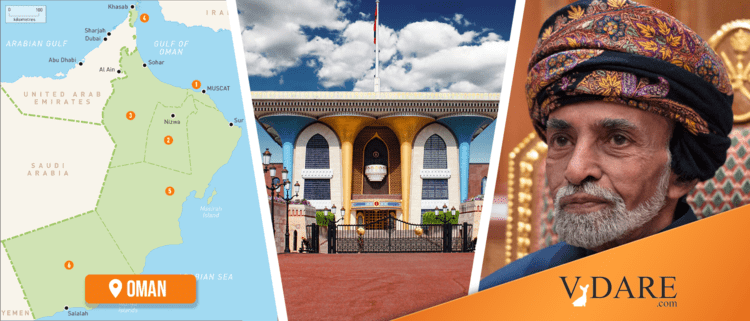


By Steve Sailer
01/11/2020
From the Christian Science Monitor in 1980:
He met the current Sultan some years ago and remembers him as a “sensitive, gentle, and aesthetic soul,” very soldierly in demeanor, who remains “extremely fond of the British family he lived with when he was at Sandhurst.” A classical music lover, the Sultan is also a great devotee of Gilbert and Sullivan. In fact, he is said to have brought his entire set of Gilbert and Sullivan records home with him from Britain in 1963, only to have them destroyed by his father. When he seized power, one of his first action was to order another set of the D’Oyly Carte Opera Company classics. In 1976, Sultan Qaboos married his cousin Sayyida Kamila who was then 14. As yet he has no heir.
From Wikipedia:
Qaboos was born in Salalah in Dhofar on 18 November 1940 as an only son of Sultan Said bin Taimur and Sheikha Mazoon al-Mashani.[
… At 20, he entered the Royal Military Academy Sandhurst. After graduating from Sandhurst in September 1962…
After his military service, Qaboos studied local government subjects in England and then completed his education with a world tour chaperoned by Leslie Chauncy. Upon his return in 1966, he was placed under virtual house arrest in the Sultan’s palace in Salalah by his father.
His father was an old time desert sheik who kept the national treasury in a strongbox under his bed. Dad did not appreciate Gilbert & Sullivan.
Here he was kept isolated from government affairs, except for occasional briefings by his father’s personal advisers. Qaboos studied Islam and the history of his country. His personal relationships were limited to a handpicked group of palace officials who were sons of his father’s advisors and a few expatriate friends such as Tim Landon. Sultan Said said that he would not allow his son to be involved with the developing planning process, and Qaboos began to make known his desire for change — which was quietly supported by his expatriate visitors.
Qaboos acceded to the throne on 23 July 1970 following a successful coup against his father, with the aim of ending the country’s isolation and using its oil revenue for modernization and development. …
The coup was supported by the British, having been “planned in London by MI6 and by civil servants at the Ministry of Defence and the Foreign Office” and sanctioned by the Prime Minister, Harold Wilson.